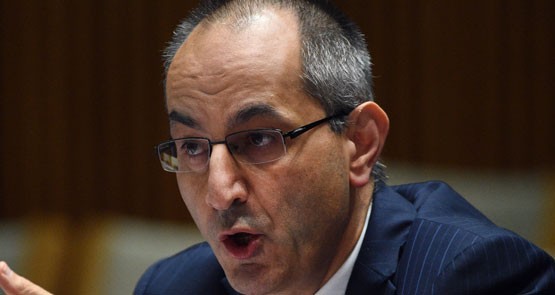
Papua New Guinea, where homosexuality is illegal, should dispatch LGBTI refugees to a third country, but it was no concern of Australia’s, Immigration head Mike Pezzullo told a Senate estimates hearing last night. And Immigration bureaucrats administering the government’s policy were “traumatised” when people criticised offshore processing.
The Department of Immigration, which earlier had confessed to a $200 million-plus error in its annual report, was appearing before the Senate’s Legal & Constitutional Affairs Committee, where Western Australian Senator Louise Pratt asked the department how many asylum seekers sent by Australia to Manus Island had been granted refugee status based on justified fear of persecution over their sexual orientation or gender identity. Immigration officials said it was a matter for the equivalent PNG department and they kept no records. Pratt then asked what happened to such refugees, since homosexuality is a criminal offence in PNG. Pezzullo responded that the matter wasn’t his department’s responsibility: Australia’s only obligation was not to send them back to their country of origin (refoulement) and its responsibilities ended when it handed them over to PNG.
Pezzullo went on to suggest that PNG should send LGBTI refugees on Manus Island to a third country if it had a problem with them — but it wasn’t Australia’s concern. “We have enough on our plate,” he told the committee, without checking whether LGBTI refugees were facing more persecution. Pezzullo said he didn’t know whether homosexual acts were illegal in PNG, before Pratt again pointed out they were specifically prohibited (male homosexual acts are punishable with 14 years’ jail in PNG).
During the hearings, Four Corners aired a program about Amnesty International’s new report detailing what the agency says is a deliberate policy of exemplary cruelty by Australia toward asylum seekers that might amount to torture. Greens Senator Nick McKim read extracts from the report, inviting Pezzullo to respond. While “categorically refuting” the Amnesty International report, Pezzullo complained about the “traumatisation” and “demoralisation” Immigration staff endured at the hands of critics of offshore detention, and complained about having to get staff to “go round the circuit again” to refute allegations of mistreatment.
That led to an extended exchange between Liberal Senator Linda Reynolds and Pezzullo in which Reynolds called criticism of offshore detention “hate speech” and Pezzullo again complained that Immigration bureaucrats, as ordinary parents, had to endure criticism from the community arising from the mistreatment and abuse of asylum seekers in offshore camps while “running up and down the touchline” at children’s sports events. Australian Border Force staff felt “hurt” when asylum seeker children called them “Nazis”, he said. This criticism of staff, Pezzullo said, was the fault of “left, Marxist publications” that claimed Immigration was part of a “totalitarian, secret state”.
Under the Australian Border Force Act, Immigration can prosecute whistleblowers who reveal the abuse of children in offshore detention facilities, with penalties of up to two years’ jail, with the AFP able to track down whistleblowers using the government’s mass surveillance laws. Earlier in the day, Pezzullo had accused Immigration bureaucrats who engaged in approved industrial action under the Fair Work Act of undermining border security and engaging in a “guerrilla industrial war” against him.








If senior bureaucrats are happy to run systems such as those on Nauru and Manus, they have only themselves to blame when they are held to account. History is unlikely to judge Mr Pezzullo very kindly – after all, it will not be written by Pauline Hanson, Ray Hadley or Alan Jones. Some people working in detention centres are indeed traumatised, but the evidence is that they are traumatised by what they are required to do, not by the criticisms voiced of the system. For a very powerful discussion, see Howard Goldenberg, ‘The clinician and detention’, Journal of Medical Ethics, vol.42, no.7, 2016, pp.416-417.
History can take a number, William: Mr Pezzullo should be roundly damned by the present too!
I hope he is OK, the poor dear.
Maybe this will cheer you up Michael.
https://www.youtube.com/watch?v=6lg51dzWHJE
Usual disgusting attitudes and outlook by Department of Immigration … just disgusting …
Having long ago “stopped the boats”, so they tell us, what do the torturers mean by “offshore processing” when people are held for years without any “processing” taking place? How long does it take to “process” someone already known to be a genuine refugee? Is this endless “processing” a device for justifying excessive funding for the ASIO secret political police? Why, when refugees have been “processed”, are there no attempts to settle them in civilised countries like Canada, America, New Zealand or (dare one suggest it?) Australia?
LGBTIQ people are seeking asylum and refugee status because many countries their lives are under threat. This is why they are seeking asylum, to send them to another country for processing is bad enough, but to send them to a country that places them in the same threat that are seeking asylum from is totally unacceptable, and whilst you can outsource activity, the Australian Government and Border Force/Immigration can not outsource accountability.
It seems this bureaucracy and its political masters have now lost any sense of morality and ethics.